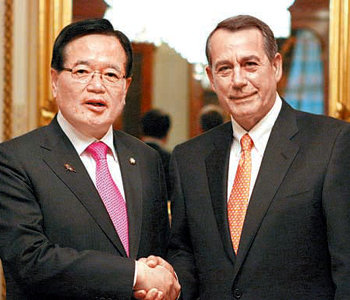Some US congressmen object Abes address in U.S. Congress
Some US congressmen object Abes address in U.S. Congress
Posted March. 06, 2015 07:30,

While Japanese Prime Minster Shinzo Abes plan to address at a joint session of the U.S. Congress during his visit in April is well accepted as fact by the Republican Party leadership, some representatives of the Republican and Democratic parties are objecting.
On the visit to the U.S. on Wednesday (local time) Koreas National Assembly Speaker Chung Ui-hwa and Saenuri Rep. Kil Jeong-woo met with U.S. House Speaker John Boehner (R-OH) and House Foreign Affairs Committee Chairman Rep. Ed Royce (R-CA). Later at a meeting with correspondents in Washington, Chung conveyed the atmosphere that House Speaker Boehner and Republican Party leadership regarded the Japanese prime ministers address in the Congress as if it is determined even without Abes sincere repentance over the Japanese wartime atrocities, and some representatives are criticizing it.
(Japan and Korea) can move forward in the future when Japan makes sincere repentance over the matter of history and takes actions accordingly," Chung said in the meeting with Boehner. "If (Abe) delivers a speech in the Congress, I wish it serves as an opportunity for Japan to be freed from shackles of the history of invasion. Boehner nodded without specific answers to Chungs remarks, reported by other participants.
Chung said that other U.S. congressmen whom he met at luncheon expressed frustration, saying, Leadership of the Republican Party did not consult with the responsible standing commission (Commission of Diplomacy) while making decision over Abes speech in the Congress.
Chung quoted another U.S. congressman as saying, Regardless of whether Abe address in the Congress or not, I will leave in the record what problem lies in his view of the history and how it harms the peace and stability of the North East Asia region."
Another congressman took an example of Indian Prime Minister Narendra Modi who was denied for a U.S. visa due to his involvement in the Muslim genocide in 2005. But later Modi took corrective actions and visited to the U.S. as a guest to the state dinner, said the congressman.
This remark can be interpreted as that Abe needs to follow the suit of the Indian prime minister, who made a sincere apology over the past wrongdoings.
Based on the responses from the U.S. congressmen, it is predicted that Abes address is already determined or at least discussed at the final stage. Some say the speech is scheduled on April 27. If it is accomplished, this would be the first time for a Japanese prime minister to address at a joint session of the U.S. Congress. Yet, the U.S. Embassy said that nothing has been decided.
kyle@donga.com







